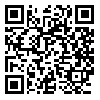Volume 18, Issue 4 (Winter 2017)
Advances in Cognitive Sciences 2017, 18(4): 24-37 |
Back to browse issues page
1- University of Mashhad Ferdowsi, Mashhad, Iran.
2- Psychology, University of Semnan, Semnan, Iran.
2- Psychology, University of Semnan, Semnan, Iran.
Abstract: (6763 Views)
Objective: The comparison of cognitive and emotional factors in patients with anxiety disorders is a new approach with therapeutic applications. This study aims to compare the cognitive flexibility, theory of mind and working memory in two groups of obsessive compulsive syndrome and normal students.
Method: In this study, a random selection of 200 students were asked to complete the Obsessive-Compulsive Inventory (MOCI). Then, the Wisconsin Card Sorting Test (WCST), theory of mind (TOM) task and Wechsler Memory Test were conducted for participants and data was analyzed using multivariate analysis of variance (MANOVA) and univariate analysis of variance (ANOVA).
Results: The findings showed that there is a significant difference between the groups on cognitive flexibility and the working memory, but there is no significant difference between the groups in theory of mind.
Conclusion: The results showed that people with obsessive-compulsive syndrome, cognitive flexibility and working memory are weaker than in healthy controls. They also seemed to have repetitive behaviors due to an inability to recall previous actions.
Method: In this study, a random selection of 200 students were asked to complete the Obsessive-Compulsive Inventory (MOCI). Then, the Wisconsin Card Sorting Test (WCST), theory of mind (TOM) task and Wechsler Memory Test were conducted for participants and data was analyzed using multivariate analysis of variance (MANOVA) and univariate analysis of variance (ANOVA).
Results: The findings showed that there is a significant difference between the groups on cognitive flexibility and the working memory, but there is no significant difference between the groups in theory of mind.
Conclusion: The results showed that people with obsessive-compulsive syndrome, cognitive flexibility and working memory are weaker than in healthy controls. They also seemed to have repetitive behaviors due to an inability to recall previous actions.
Type of Study: Research |
Subject:
Special
Received: 2016/04/26 | Accepted: 2016/09/8 | Published: 2016/12/21
Received: 2016/04/26 | Accepted: 2016/09/8 | Published: 2016/12/21
| Rights and permissions | |
 |
This work is licensed under a Creative Commons Attribution-NonCommercial 4.0 International License. |


